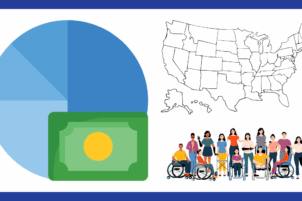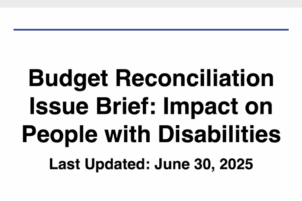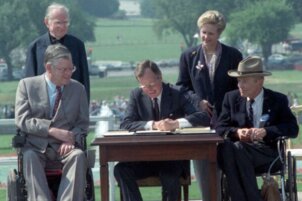To celebrate Mother’s Day, RespectAbility Communications Apprentice Madison Essig spoke with Dani Izzie, advocate, activist and mother with a disability. Izzie’s journey to motherhood is the subject of the upcoming documentary film Dani’s Twins.
Transcript
Madison Essig: Hi, my name is Madison Essig and I am a Communications Apprentice here at RespectAbility. As we celebrate Mother’s Day coming up soon, I wanted to highlight mothers with disabilities, such as yourself. Dani, we are so pleased you are with us today, and look forward to learning more about you and how you are celebrating Mother’s Day this year.
Dani Izzie: Thank you! I’m so honored to be here and I’m happy to meet you today Madison.
Madison Essig: Thank you so much. If you’re fine with it, let’s get into the interview questions.
Dani Izzie: Yeah, let’s get going. Sounds good.
Madison Essig: Yes. So my first question is how did your life change after your fall?
Dani Izzie: Well let’s see. That was, oh, 13 years ago. I had a spinal cord injury that resulted from just falling down, just a freak accident. It changed everything. it changed not only the way that I got around the world — of course I became a permanent wheelchair user, so not only did it change my mobility, I would say it shook me to my very core. And it — for a while it made me question my identity. You know I had — I didn’t know who I was, like, in this new body, and I didn’t know anything about living with a disability. So it was a huge adjustment and at the beginning it was very traumatic. But over time I grew, and I adapted, and a lot of wonderful things have come into my life. And I would say that all in all, I’m pretty blessed.
Madison Essig: Yes, and that’s amazing. I mean, all of your achievements that you have done is truly incredible, so I thank you for that. My second question is when you became pregnant, what did you find were the perceptions around women with spinal cord injuries and having children? Well, so obviously I have been talking to a lot of other women with spinal cord injury and who had disabilities — other types of disabilities as well. I was talking to them to, like, get support and learn about, you know, what life would be like and what it would be like to go through this pregnancy and then to become a parent. And honestly, a lot of people had negative experiences with obstetrics and gynecology. A lot of people experienced poor bedside manners from doctors and attitudinal barriers from doctors who actually told them, you know, that they shouldn’t have babies, and — or a baby — and propose to them that they pretty much get sterilized, you know, or and — you know. So I had heard some — negative things so I was nervous getting into it. Luckily I had wonderful doctors that were extremely supportive and that — and they kind of proved that wrong, but I know it’s still an issue. And then I started becoming public with my pregnancy because I became involved in a documentary film about it. The film is called Dani’s Twins, and I’ll talk about it a little more later — it does come out — it’s gonna come out at a film festival soon. But when I became more public, especially on social media, that’s where I started getting some interesting responses to my twin pregnancies. I have people say — strangers on the internet tell me things like “you are so selfish to be having children. Who’s gonna take care of your kids if you can’t take care of yourself? All the burden is gonna fall on your husband’s shoulders.” Just — it’s awful — awful comments that no human being deserves to endure. And that was pretty upsetting, but you know, I thought — I think a lot of it is just, you know, ignorance. These people have no idea who I am or what my lifestyle is like. They’re clueless, you know? And they need more exposure to people with disabilities and our — lifestyles, and the fact that we live normal lives too, we just do things differently.
Madison Essig: Yeah — which I completely agree. I mean, I can personally attest to that, because it’s just important that we do that, so I completely understand. I think this is actually a perfect time to talk about the documentary film. Would you like to tell us more about that?
Dani Izzie: Yeah, sure! So I — a friend of mine is a documentary filmmaker, and when he found out that I was pregnant with twins, he thought that was really cool, especially as a quadriplegic woman — it’s pretty rare. And so — I agreed to allow them to document my pregnancy journey. So that started in January 2020. Sure enough, in the middle of filming, the pandemic started. And we had to stop. And I was devastated, and we had put so much effort into it that I was like, no, I don’t want to let this go. This story is so important for people to see. So my husband and I actually started filming ourselves. And we worked closely with the film team to learn, like, how to get the angles and get the shots and to coordinate, you know, what we needed to get on video. Madison — I got — I filmed myself in labor in the car! So when I was going into labor, I was like, we have to get this on camera, you know, we didn’t have the film crew there because of the pandemic, and I had to do it, so we filmed ourselves rushing to the hospital. And I went in for an emergency c-section when I got to the hospital, and we filled this — filmed an amazing moment where, you know, Rudy was — an intimate moment where he was just, like, nervous and talking straight to the camera. Anyway, so we ended up being able to finish the film later in the year, the film crew came and helped us tie it up. But I do think like that element where we had to step in and take over makes it really special and authentic. So yeah, it’s going to be at a film festival in May. I’m not allowed to say where yet — where we’re premiering, but it’s very exciting. Again, it’s called Dani’s Twins. You can look it up on the internet.
Madison Essig: Yes, well I will definitely be checking that out when it comes out. My third question is how have you had to adapt the things you have to do to be a mom and take care of your children?
Dani Izzie: You know, I — thought a lot about this while I was pregnant, like, how am I gonna do all this stuff? Like, where am I gonna find adaptive equipment? Where am I gonna find a special crib that I can reach, that I can access from my wheelchair? You know, how am I gonna feed two babies — not just one, especially having paralysis in my hands, you know? There were so many questions and I tried to prepare as much as I could, and I did find, like, a lot of adaptive tools and equipment. But when it comes down to it, I needed a lot of support. There are a lot of things that I simply can’t do on my own, and that’s okay. It’s nothing to be ashamed of. I need assistants, right? So I need people around me that can help facilitate my mom duties, you know? So my husband — he is not — he does not have a disability but he — helps a lot. And his mom helps a lot, and my dad helps as well. So everybody pitch in — pitches in, and it’s amazing. Like, I love the fact that the grandparents are so — involved in our kids lives and we have — this tribe around us, you know, that supports us and helps us. And that’s a really beautiful thing, so.
Madison Essig: And I completely understand that support network is crucial.
Dani Izzie: Yeah.
Madison Essig: Yes. So my fourth question is how do you talk to your children about having a disability or people with disabilities?
Dani Izzie: Well, since right now they’re only two [chuckles] we talk about the wheelchair in a really positive way. Like, they just think my wheelchair is the most fun thing ever, and they like to sit on my lap and go for rides. And it’s so funny because sometimes, like, they’ll see things with wheels on them that they’ve never seen before, for example, a shopping cart at the grocery, and they’ll call it — they call it a wheelchair. I’m like, that’s not a wheelchair, it’s a grocery cart, but it’s just so funny because they — they don’t attach any, like, negative things to it. Like, they just see it what it is, it’s a tool, right? And it’s a fun tool sometimes. So I think as they grow up and they start to understand more, I’m really gonna teach them that — to look at disability in a neutral way. You know, it’s just a fact of life. Some people have disabilities. We don’t need to attach anything else to that. We don’t have to say oh, it’s a tragedy, oh, they need to be cured, or oh, they’re so inspiring. We can let the people with the disabilities tell their story, right, and we respect that. So I’m gonna try my best to guide them on that, and to also teach others on how to interact with people with disabilities.
Madison Essig: Yes, and that’s something I actually do every day in my life, whether that’s with my friends here at college, or with other members of my family and everything which is really important.
Dani Izzie: Right.
Madison Essig: So my sixth question is — this is actually a little bit of a personal question even for me. I sometimes have people who stare at me, or who even have said not nice things. This is sometimes in terms of my educational journey, actually. I started in the Mason Life program here at George Mason University and I was transitioning to become a full-time student into the class of 2022. And the program — well not the program, but some people said that they did not fully support me in becoming a full-time student, because they thought I should stay in the program and everything. And I had dealt with so many battles in that myself and I did — my family became involved at some point, and then after that, one of my good friends actually did as well. So it took a whole support network to get me to where I am. So my question is how — has this happened to you and how do you deal with it?
Dani Izzie: Well first of all, I’m really sorry. My heart hurts to hear that you had to go through all that struggle and that battle to have to prove yourself, and to have access to something that everybody else has a privilege to have access to. And in terms of myself I — you know, I actually had some issues when I was in my graduate program. It wasn’t anything as bad as what you had to go through but, you know — they made certain accommodations for me because of my disability. There was a disability resource center at the university where I was. And I needed things like, you know what I needed, I needed extra time on testing. And I had to do testing at a separate facility because I used voice to text software. And I needed more time because I have — when I type, I type one letter at a time. I don’t have all my fingers to use everything. And also, with my disability sometimes I have to take long bathroom breaks, and I have issues with blood pressure where I get dizzy, I need to stop and take breaks. So there’s multiple reasons why I needed that accommodation. But I had a professor criticize me about my accommodations. He didn’t understand why I needed extra time, because he saw my physical disability and he thought that that didn’t warrant extra time. And honestly, like, I didn’t want to explain to him why I needed extra time, because that’s my private business. That’s my private medical information. That belongs to me and I shouldn’t have to, you know, I shouldn’t need to tell the professor that. That’s between me and the disability resource center. And it was really upsetting because it made me afraid that he would have, like, a negative bias against me, and maybe even grade me unfairly. Because I think he thought that I had an unfair advantage. So you know I definitely — and that’s just — that’s a discriminatory attitude right there, and ableism, as some people call it. And he didn’t even realize it. And I wish I had, at the time, been able to sit down and have a conversation with him. I wish I could go back and educate him, you know? But yeah.
Madison Essig: Which makes complete sense. My school alone, there’s a lot of people with disabilities here that also do have accommodations, and there has been — a slew of some people with the accommodations and how they weren’t fully met in terms of some of their classes, for example, or other things like housing. That was actually a problem for me as well. I’m in senior year this semester here at school, and I was still getting my housing through the Mason Life program as I still have a couple of friends, and they wouldn’t allow me to room with my friends. They were going to have me in a room by myself, or whatever. So I had to talk to disability services. They helped, but not as much. They were on the same side as the program. And I had a meeting with them — literally I was back home in DC and I had a online meeting with them, and it did not go well. I was advocating for myself and halfway through — my mom was hearing what was going on — as she was in the room, like, way across, and she came in she started basically yelling at them saying that this is ridiculous, Madison should be able to live with who she wants. So that was also something that I dealt with, and yes, it did take my mom to help.
Dani Izzie: Oh my gosh — I — see, what are people thinking? Like, honestly, like, that’s literally segregation. That’s what I would have said, you know? I would have said you’re segregating me, you know, that’s horrible! I am — I’m so sorry and I’m just glad that you are a great advocate for yourself and your mom is a great advocate for you as well, so thank god for that.
Madison Essig: Thank you so much. I just have one last question and one last question. Since Mother’s Day is coming up, I was wondering how are you going to celebrate Mother’s Day this year?
Dani Izzie: Oh, I don’t know. I hope my husband has something good planned! We’ll see. I think last year we went out to lunch at a little winery here in Virginia. I’m not sure what we’re gonna do this year. I can’t wait to celebrate, you know, being a mom, and I’m just so in love with these little babies that I got to have, and yeah, I can’t wait. Happy Mother’s Day to everybody out there, and all the moms, and all the kids, and even the people that, you know, don’t have mother figures, you know, my heart goes out to you as well.
Madison Essig: I actually have no idea what I’m doing for mother’s day because I am currently in Fairfax, Virginia, here at school, and I’m from D.C., so it would be nice to actually go home to D.C. and actually celebrate Mother’s Day with my mom back at home, so hopefully that will be squared away.
Dani Izzie: Yes, that’s amazing. You know, we don’t live too far from each other. I am — I used to be in the D.C. area and then we moved out to the country, out near Shenandoah. So I’m about two — hours away from D.C. Yeah, so.
Madison Essig: Well, those are all the questions I had. Thank you so much, it was great to meet you, thank you so much for allowing me to interview you today, and good luck to you in your future endeavors!
Dani Izzie: You too, thank you Madison.
Madison Essig: Thank you.







